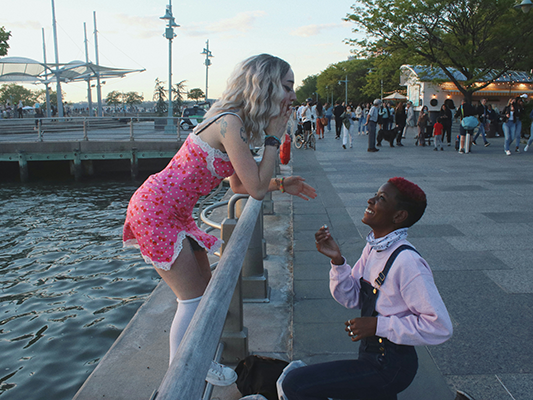
LGBTQ+ History By The Decades (2010s)
7 min read
This series, By The Decade, looks at LGBTQ+ history in the UK to see how the community has been affected, celebrated, and been a catalyst for change.
Let’s cast our minds back a few years, to the 2010s, and explore all the key moments of LGBTQ+ history that took place during this decade!
LGBTQ+ history before the 2010s
Before we dive into the LGBTQ+ history of the 2010s, here’s a quick recap of some key events that happened in the decade before (you can read more detail here):
- 2003: Section 28 was finally repealed. If you know your 1980s LGBTQ+ history then you’ll be aware of the negative impact that Section 28 had on the community.
- 2005: The Civil Partnership Act. This Act allowed same-sex couples to legally allowed to enter into binding partnerships.
- 2005: The Gender Recognition Act. This historic Act gave trans people full legal recognition of their gender.
LGBTQ+ history during the 2010s
2010: The Equality Act
This single Act replaced the Sex Discrimination Act 1975, the Race Relations Act 1976, and the Disability Discrimination Act 1995. The new single Equality Act took its place in UK LGBTQIA history by covering discrimination against:
- Sexual orientation (actual or perceived)
- Race
- Age
- Disability
- Marital status
2011: Lifting of the lifetime ban on blood donations
Due to the 1980s AIDs crisis, gay men in the UK had a lifetime ban on donating blood. In 2011, this lifetime ban was lifted and gay men were given a ‘one-year deferral’ — meaning that gay men who abstained from sex for 12 months would be eligible to donate blood.
Read on to see how the change-makers in LGBTQ+ history fought to reduce this 12-month deferral!
2013: Alan Turing received a posthumous royal pardon
If you’ve heard of Alan Turing, you’ll know he was the war-hero cryptographer who helped to break the enigma code in World War Two, had been convicted of ‘gross indecency’ and chemically castrated — just because he was gay.
He was naturally already part of LGBTQ+ history, but in 2013 this position was cemented…
Turing received a posthumous royal pardon.
“Turing deserves to be remembered and recognised for his fantastic contribution to the war effort and his legacy to science. A pardon from the Queen is a fitting tribute to an exceptional man.” — Justice Minister Chris Grayling
2014: The Marriage Act
The 2014 Marriage Act allowed same-sex couples in the UK to enter into marriage and have the same rights as heterosexual marriages. Same-sex couples who were already in civil partnerships could choose to convert this to a marriage.

The Marriage Act came into place on March 29 2014;
And at exactly one minute past midnight?
Peter McGraith and David Cabreza from north London — who had been partners for 17 years — became the first same-sex couple in the UK to get married!
Interesting fact:
In 2015, Mikhail Ivan Galltinov and Mark Goodwin became the first couple to have a same-sex wedding in a UK prison, marrying at Full Sutton Prison in East Yorkshire.
2015: The Royal Vauxhall Tavern received a Grade II Listing
The Department of Culture, Media and Sport made history in 2015 by giving a Grade II Listing to the Royal Vauxhall Tavern (a historic LGBTQ+ venue in London). This was the first ever building in the UK to receive a listing based on its LGBTQ+ history. The Tavern, to this day, famously enjoys:
- Drag shows
- Cabaret shows and musicals
- Live music and dance performances
- Stand-up comedy
- Club nights and more
2015: Petition for non-binary gender markers in passports
The UK LGBTQ+ community petitioned the government to allow the use of non-binary gender markers in passports. However, their petition was not successful, and here’s how the story panned out:
- The title ‘Mx’ was already widely accepted within business, organisations, and education as an alternative for non-binary people. Mx was however not an option on passports.
- A petition was sent to the government.
- In September 2015, The Ministry of Justice responded by saying they were not aware ‘of any specific detriment’ experienced by non-binary people unable to have their genders legally recognised.
- The bill was not passed.
- As of 2024, the bill still has not passed and the option is still not available.
If you’re ready to take your place in LGBTQ+ history, this might be an issue you want to campaign for!
2016: Prince William posed for the cover of Attitude Magazine
Attitude magazine is the UK’s best selling gay magazine. The Prince had met with members of the LGBTQIA+ community to hear about their experiences of homophobic, bi-phobic and transphobic bullying, and to discuss the mental health implications that come with it.
By posing on the cover of Attitude magazine, Prince William made history and showed his belief that no one should be bullied for their sexuality. It marked the first time that a member of the royal family had been photographed for the cover of a gay publication.
2016 was a good year for magazine covers;
Elle Magazine printed a special collectors’ cover for their September issue, featuring Hari Nef (most known for her role as Gittel in Transparent, and she recently had a role in the 2023 Barbie movie). This was the first time an openly trans woman was on the cover of a major UK magazine.
2017: The Policing and Crime Act
After the pardoning of Alan Turing in 2013, many people thought that other gay men who had been convicted whilst homosexuality was illegal should also be pardoned.
In 2017, the Policing and Crime Act was set in place (which became known as the Alan Turing law). It pardoned all historic instances of criminal convictions and gross indecency against gay men in England and Wales. A moment of justice being served in LGBTQ+ history!
2017: A change in the rules on donating blood
Back in 2011, a lifetime ban on gay men donating blood was lifted and replaced with a ‘one-year deferral’. Sexual health and LGBTQ+ organisations campaigned for years against this 12-month deferral, and in 2017 it was reduced to three months.
This change was significant, but it still prevented many gay men from donating blood if they were having regular sex — even if that was always with the same partner.
2017: The introduction of PrEP
In 2017 one medicine entered into LGBTQ+ history! PrEP (pre-exposure prophylaxis) is a medicine that reduces a person’s risk of becoming infected with HIV through sex or injection drug use.
So what’s the deal with PrEP?
- Taking PrEp means taking anti-HIV medicine, either daily or around the time of sexual activity.
- In October 2017, a trial with 10,000 places launched across England.
- Due to the demand for PrEP, the trial places were quickly increased by an extra 3,000 places.
- In 2019, Secretary of State Matt Hancock committed to the aim of getting to zero new HIV transmissions in the UK by 2030. The UK government also promised to double the number of places on the PrEP trial.
- In March 2020, it was announced that PrEP would become routinely available for free on the NHS and in sexual health clinics.
“I take three tablets a day, and I live a normal life expectancy and I am undetectable – that means that the virus cannot be passed on from me” — Charity Kase.
Charity Kase is the stage name of Harry Whitfield — a drag performer best known for competing on the third series of RuPaul's Drag Race UK — who opened up on RuPaul's Dragrace UK about living with HIV and taking PrEP. Watch it here.
2018: Marriage equality in Northern Ireland
In 2018, lots of people from the UK LGBTQ+ community were getting married but Northern Ireland was still without marriage equality. (Civil partnerships had been available in Northern Ireland since 2005.) Marriage equality was voted on numerous times by the Northern Ireland Assembly and, on the fifth vote in 2018, history was made as it finally passed by a slim majority.
2019: Laverne Cox features on the cover of British Vogue
Meghan Markle, Duchess of Sussex, was asked in 2019 to be the guest editor of British Vogue. She chose fifteen inspiring women to appear on the cover of the September issue;
One of those women was Laverne Cox (best known for her role as Sophia in Orange Is The New Black). Cox became the first openly transgender woman to appear on the cover.
Continuing LGBTQ+ history to the present day
The UK has come a long way in its treatment, representation, and rights for the LGBTQ+ community. But there is still a lot of work to be done, and many amazing charities, organisations, and activists continue the fight for equality. If you want to join them and make a mark on LGBTQIA+ history, you might be interested in volunteering.
If you’re new to volunteering, find out if it’s for you by reading this.
NCS experiences are inclusive of all
Sign up for an NCS experience and you’ll be heading off for five days (and four nights) with lots of other young people from all sorts of backgrounds. Everyone is welcome, and everyone is celebrated. So grab your place today.
Read more:
UK LGBTQ+ history of the 1980s
UK LGBTQ+ history of the 1990s
UK LGBTQ+ history of the 2000s

